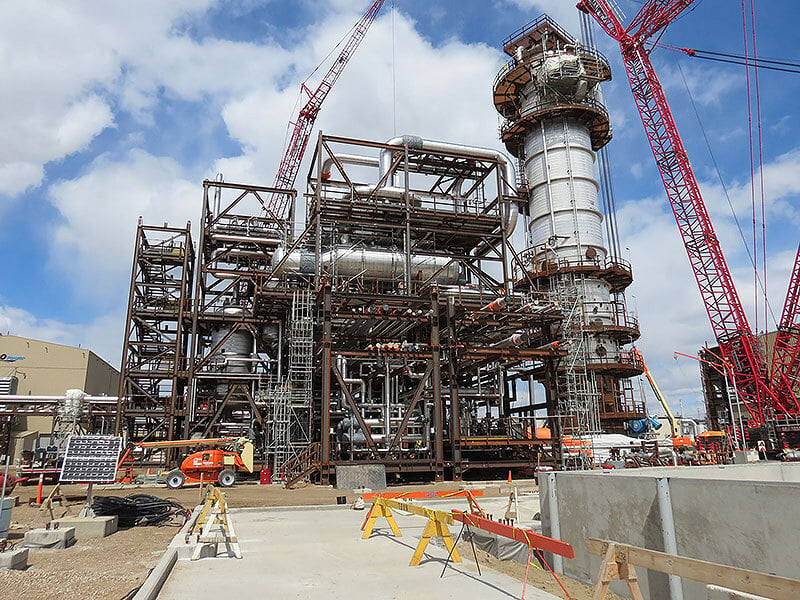
In a significant move towards a cleaner future, Shell Canada announced a major investment in carbon capture and storage (CCS) technology. On June 26, 2024, the company gave the final green light (Final Investment Decision or FID) to two crucial projects: the Polaris project and the Atlas Carbon Storage Hub.
RELATED: Shell to Build Carbon Capture and Storage Projects in Canada

Capturing Emissions at the Source: The Polaris Project
This decision marks a major step forward for Shell's commitment to reducing its environmental footprint. The Polaris project, located at the Shell Energy and Chemicals Park in Scotford, Alberta, is designed to capture a significant amount of carbon dioxide (CO2) – approximately 650,000 tonnes annually – from the company's refinery and chemicals complex there.
Safe and Secure Storage: The Atlas Carbon Storage Hub
But capturing the CO2 is only half the battle. To achieve permanent reduction in emissions, the captured CO2 needs safe and secure storage. This is where the Atlas Carbon Storage Hub comes in. Partnering with ATCO EnPower, Shell plans to utilize the first phase of Atlas to provide permanent underground storage for the CO2 captured by Polaris.
"Carbon capture and storage is a key technology to achieve the Paris Agreement climate goals," said Huibert Vigeveno, Shell's Downstream, Renewable and Energy Solutions Director. This quote highlights the importance of CCS technology in the fight against climate change, aligning Shell's efforts with the international agreement aimed at curbing greenhouse gas emissions.
Building on Success: Lessons Learned from the Quest Facility
The Polaris and Atlas projects are not starting from scratch. They leverage the success of the existing Quest CCS facility, also located at the Scotford complex. Since 2015, Quest has safely captured and stored over nine million tonnes of CO2, demonstrating the viability of this technology. The lessons learned from Quest will be invaluable in ensuring the smooth operation of Polaris and Atlas.

>> In Other News: Zelestra Launches New Brand, Making Decarbonization a Reality
Technical Details and Partnerships
The following section details the technical aspects of the projects and the collaborative efforts involved.
Significant Emission Reductions with Polaris
Atlas Hub Infrastructure: Pipelines and Deep Storage
Strategic Partnership with ATCO EnPower
Future Expansion Potential
Investment and Timeline
This commitment to CCS technology is part of Shell's broader strategy to invest in low-carbon solutions. The company has pledged $10-$15 billion between 2023 and 2025 to support the development of various initiatives, including CCS, electric mobility, low-carbon fuels, renewable energy generation, and hydrogen.
Both the Polaris and Atlas projects are expected to be operational by the end of 2028. This timeline reflects the significant planning and engineering required for such large-scale projects.
Conclusion: A Brighter Future with Innovation
Shell's investment in CCS projects in Canada demonstrates a strong commitment to reducing its environmental impact. The success of these projects could have a far-reaching influence, paving the way for wider adoption of CCS technology and contributing to the fight against climate change. As we strive for a sustainable future, innovative solutions like carbon capture and storage offer a glimmer of hope.
Subscribe to the newsletter
Daily decarbonization data and news delivered to your inbox
Follow the money flow of climate, technology, and energy investments to uncover new opportunities and jobs.
Latest issues
-
Kita's $29M Bet Signals Carbon Insurance Is Here
Inside This Issue 🛡️ Kita's $29M Bet Signals Carbon Insurance Is Here 🏗️ CCI BioEnergy Selects Arcadis As Design-Engineer Partner Under Master Service Agreement 🤝 Tapestry and Climeworks Announce ...
-
Cummins Quit Electrolyzers. Electric Hydrogen Didn't.
Inside This Issue ⚡ Cummins Quit Electrolyzers. Electric Hydrogen Didn't. 🧪 New Electrified Method Captures Carbon Dioxide From Air 🌾 Iowa Could Be on the Cusp of a Hydrogen Rush; Lawmakers Weigh ...
-
Inside America’s Carbon Capture Reality Check
Inside This Issue ⚡ Duke Energy Florida Goes Live With First 100% Hydrogen System ✈️ Air bp Signs Agreement With Airbus on Flight Services and Fuel Supplies in Europe 🌊 Pairing Reefs and Mangroves...
Company Announcements
-
Vancouver, British Columbia--(Newsfile Corp. - February 18, 2026) - Element One Hydrogen & Critical Minerals Corp. (CSE: EONE) ("Element One" or the "Company") is pleased to announce the format...
-
CCI BioEnergy Selects Arcadis As Design-Engineer Partner Under Master Service Agreement
First project under the agreement will contribute to doubling the processing capacity of Toronto’s Disco Road Organic Processing Facility Toronto, ON – Arcadis (EURONEXT: ARCAD) is pleased to anno...
-
QIMC Reports Diamond Drilling Underway at West Advocate Hydrogen Project, Nova Scotia
Montreal, Quebec-- Québec Innovative Materials Corp. QIMC (OTCQB: QIMCF) (FSE: 7FJ) ("QIMC" or the "Company") announces that diamond drilling operations commenced on February 17, 2026, at its West ...
-
Seaweed Farming Could Remove Millions of Tons of CO₂ Each Year, Study Finds
Seaweed farming is a key strategy for carbon dioxide removal (CDR), offering both climate mitigation and ecological benefits. A recent study published in Communications Sustainability examined how ...